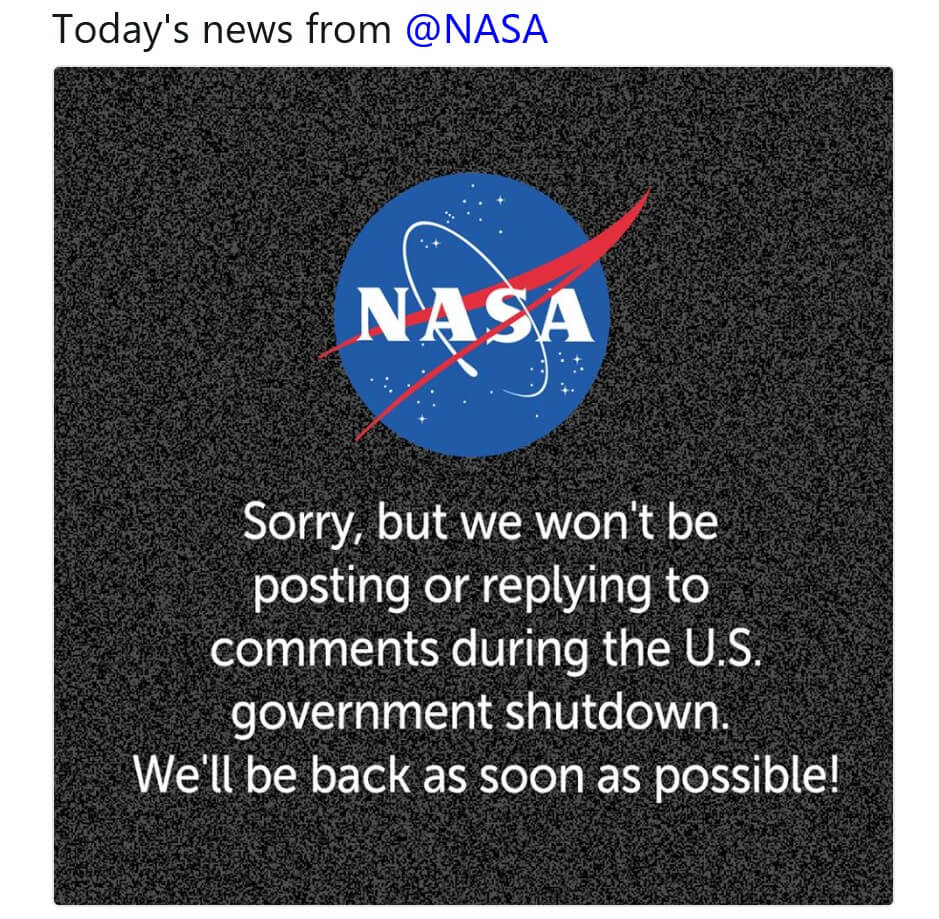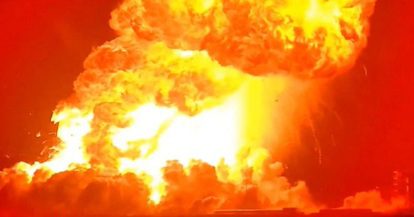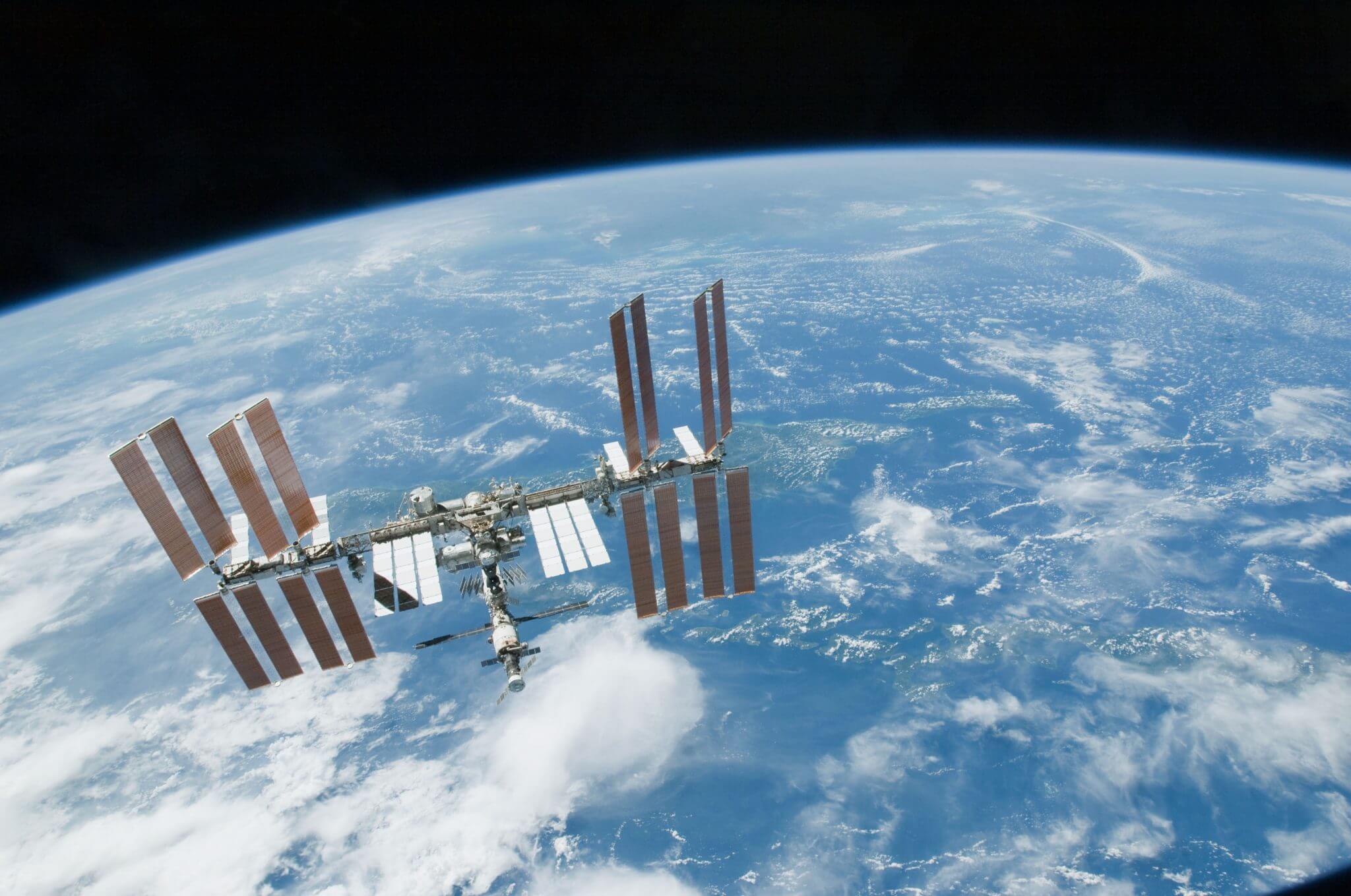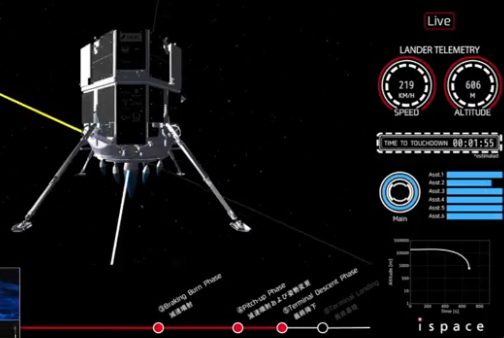The four-day US government shutdown, caused by the Democratic Party and some Republicans refusing to sanction funding because of a row over the immigration status of some children – extended to NASA and government-owned vehicle facilities and launch pads, where staff were being put on unpaid holiday. Already a test firing of the Falcon 9 Heavy has been postponed – with a domino effect on the rest of the SpaceX and ULA launch schedules, with Cape Canaveral, Kennedy Space Center and Vandenberg all having launches delayed.

NASA’s Twitter message about the shutdown. Courtesy: NASA/Twitter
The increasingly bi-partisan – or rather the pro-Trump/anti-Trump – nature of US politics has also stopped some other space measures from taking place. NASA is still without a head after the US Senate failed to back Trump’s nomination of Republican Congressman Jim Bridenstine for the role of Administrator. Concerns remain about Bridenstine’s sceptical attitude to global warming and its causes.
By the way, President Trump, having refused to sign the Paris Accord (to the chagrin of other governments and NASA and NOAA climate scientists), subsequently banned the term “climate change” from Federal agency announcements and publications. This is in addition to censoring the word “diversity” – whether used in a biological diversity context, or in promoting a pro-diversity social attitude. Nevertheless, Trump hinted that he may yet sign the Paris Accord – if parts of it are changed.
There are some positives for the space industry from President Trump’s first year in office. President Trump has wisely ordered NASA to concentrate on returning to the Moon, rather than its rather vague plan to land humans on Mars. He is said to be keen on the latter but prefers a public-private effort involving Elon Musk’s SpaceX. That said, the public-private programme supposed to be supplying NASA with a way of transporting US astronauts into low Earth orbit is embarrassingly late. Both Boeing and SpaceX have confirmed that they will not be ready until 2020 – after NASA has run out of its booked Russian Soyuz rides to the International Space Station (ISS). The controversy over Russian alleged involvement in US elections might preclude any further space cooperation post the International Space Station (ISS).
And finally, while not all are in favour of his tax cuts, a cut in the rate of corporation tax to internationally competitive levels has helped sustain buoyant conditions in the US economy and stock market. Surprisingly, Trump has not increased the US defence budget as much as was expected. Given that his tax cuts will probably mean that tax revenues will initially fall (before perhaps rising due to increased growth), there were fears that dramatic increases in defence spending could have destabilised US government finances. In the end, only a real terms increase of 2% was registered for FY2018, although President Trump has asked for more for FY2019 – something that maybe needed given that conflict with North Korea could break out. While the defence related space sector missed out given that there was no large uplift from increased defence spending this time, commercial space still benefited as the US defence department continued to use commercial satellite telecommunications capacity to make up shortfalls in its own.
Update on 23 January 2018: The US Senate allowed the budget allocations to pass on a temporary basis via a short-term spending bill, with a new deadline of 8 February. Meanwhile, in a separate development that might destabilise world trade, President Trump has approved “America First” tariff charges on imported washing machines and solar panels. While the solar panel tariffs are mainly aimed at the domestic power market, they will have an effect on space projects as well.
Seradata rating of Donald Trump’s first year for space (excluding his other policies): Achievements: 7 out of 10 (he would have got an 8 if he had signed the Paris Accord). Style marks: 0 out of 10
Post Script: In what was seen as his acceptance that his “Twitter denouncement” style, along with some of his domestic policies, may have been too divisive, in his annual “State of the Union” address US President Donald Trump called for more national unity. This softer line was welcomed by many (although not by those he had previously accused of “fake news”). Nevertheless, on foreign policy he kept his hard line stance, especially over facing down North Korea’s nuclear weapon/ballistic missile programme.






